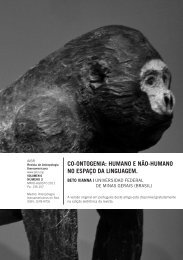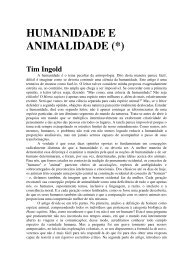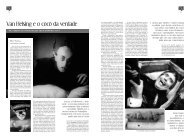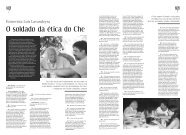Merleau-Ponty, 1964. Eye and mind. - Biolinguagem
Merleau-Ponty, 1964. Eye and mind. - Biolinguagem
Merleau-Ponty, 1964. Eye and mind. - Biolinguagem
- No tags were found...
Create successful ePaper yourself
Turn your PDF publications into a flip-book with our unique Google optimized e-Paper software.
cannot come to it by some intrusion from outside. Such bodily events are "instituted by<br />
nature" in order to bring us to see this thing or that. The thinking that belongs to vision<br />
functions according to a program <strong>and</strong> a law which it has not given itself. It does not<br />
possess its own premises; it is not a thought altogether present <strong>and</strong> actual; there is in its<br />
center a mystery of passivity.<br />
Thus the Cartesian situation is as follows. Everything we say <strong>and</strong> think of vision has to<br />
make a thought of it. When, for example, we wish to underst<strong>and</strong> how we see the location<br />
of objects, we have no other recourse than to suppose the soul to be capable, knowing<br />
where the parts of its body are, of "transferring its attention from there" to all the points of<br />
space that lie along the prolongation of its bodily members. 28 But so far this is only a<br />
"model" of the event. For how does the soul know that space of its body which it extends<br />
toward things, that primary here from which all the theres will come This space is not,<br />
like them, just another mode or specimen of extension; it is the place of the body the soul<br />
calls "mine," a place the soul inhabits. The body it animates is not, for it, an object among<br />
objects, <strong>and</strong> it does not deduce from its body all the rest of space as an implied premise.<br />
The soul thinks according to the body, not according to itself, <strong>and</strong> space, or exterior<br />
distance, is also stipulated within the natural pact that unites them. If, at a certain degree<br />
of ocular accommodation <strong>and</strong> convergence the soul becomes aware of a certain<br />
distance, the thought which draws the second relationship from the first is as if<br />
immemorially encoded in our inner workings. "Usually this comes about without our<br />
reflecting upon it—just as, when we clasp a body with our h<strong>and</strong>, we conform the h<strong>and</strong> to<br />
the size <strong>and</strong> shape of the body <strong>and</strong> thereby sense the body, without having need to think<br />
of those movements of the h<strong>and</strong>." 29 The body is both the soul's native space, <strong>and</strong> the<br />
matrix of every other existing space. Thus vision doubles. There is the vision upon which<br />
I reflect; I cannot think it except as thought, the <strong>mind</strong>'s inspection, judgment, a reading of<br />
signs. And then there is the vision that actually occurs, an honorary or established<br />
thought, collapsed into a body—its own body, of which we can have no idea except in the<br />
exercise of it, <strong>and</strong> which introduces, between space <strong>and</strong> thought, the autonomous order<br />
of the composite of soul <strong>and</strong> body. The enigma of vision is not done away with; it is<br />
shifted from the "thought of seeing" to vision in act.<br />
Still, this de facto vision <strong>and</strong> the "there is" which it contains do not upset Descartes's<br />
philosophy. Since it is thought united with a body, it cannot, by definition, truly be<br />
conceived. One can practice it, exercise it, <strong>and</strong>, so to speak, exist it; yet one can draw<br />
nothing from it which deserves to be called true. If, like Queen Elizabeth, 30 we want at all<br />
costs to think something about it, all we can do is go back to Aristotle <strong>and</strong> scholasticism,<br />
to conceive thought as a corporeal something which cannot be conceived but which is<br />
the only way to formulate, for our underst<strong>and</strong>ing, the union of soul <strong>and</strong> body. The truth is<br />
that it is absurd to submit to pure underst<strong>and</strong>ing the mixture of underst<strong>and</strong>ing <strong>and</strong> body.<br />
These would-be thoughts are the emblems of "the practice of everyday life," the verbal<br />
blazons of union, permissible only if not taken to be thoughts. They are indices of an<br />
order of existence—of humanity <strong>and</strong> world as existing—of which we are not held to<br />
produce a concept. For this order there is no terra incognita on our map of Being. It does<br />
not confine the reach of our thoughts, because it, just as much as they, is sustained by a<br />
Truth which grounds its obscurity as well as our own lights. 31<br />
We have to go to these lengths to find in Descartes something like a metaphysics of<br />
depth. For we are not present at the birth of this Truth; God's being is for us an abyss. An<br />
anxious trembling quickly mastered; for Descartes it is just as futile to plumb that abyss<br />
as it is to think the space of the soul <strong>and</strong> the depth of the visible. Our very position, he<br />
would say, disqualifies us from looking into such things. That is the secret of Cartesian<br />
equilibrium: a metaphysics which gives us definitive reasons to leave off doing<br />
metaphysics, which validates our self-evidence while limiting it, which opens up our<br />
11









